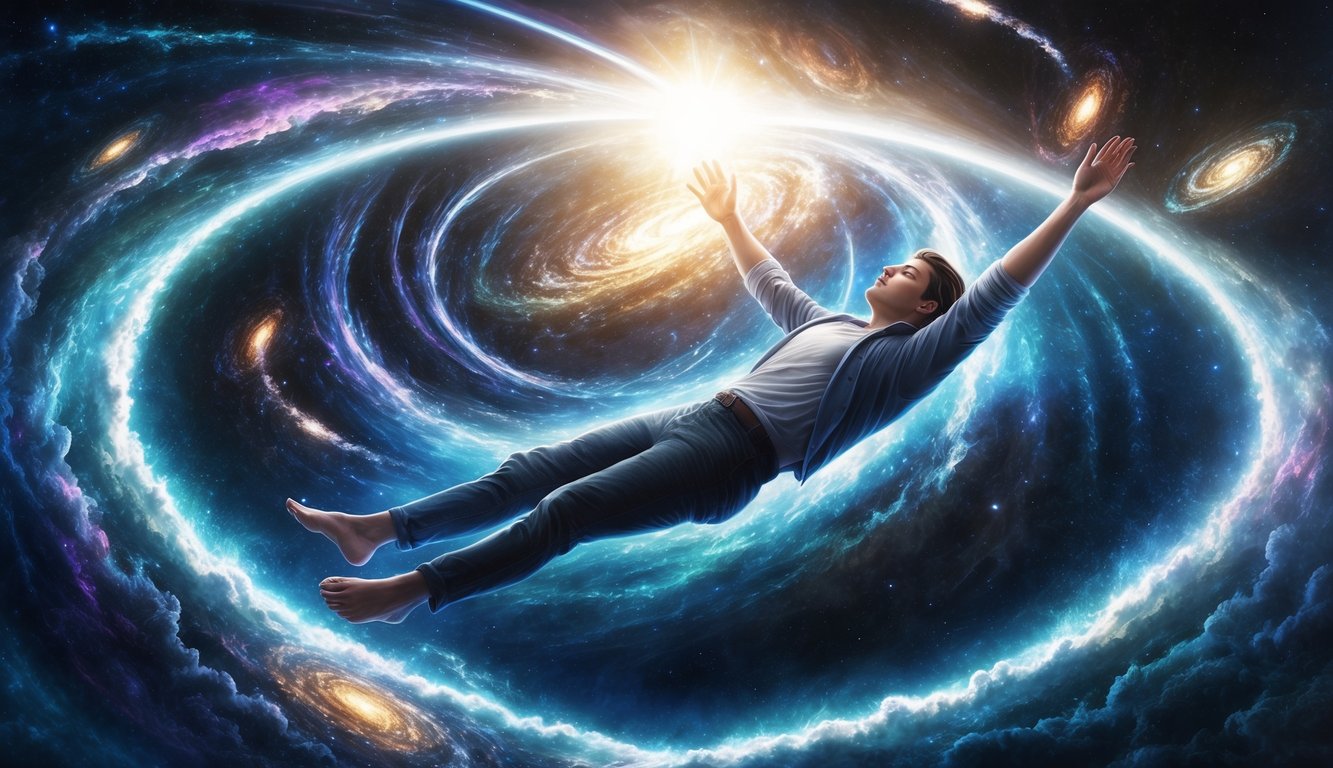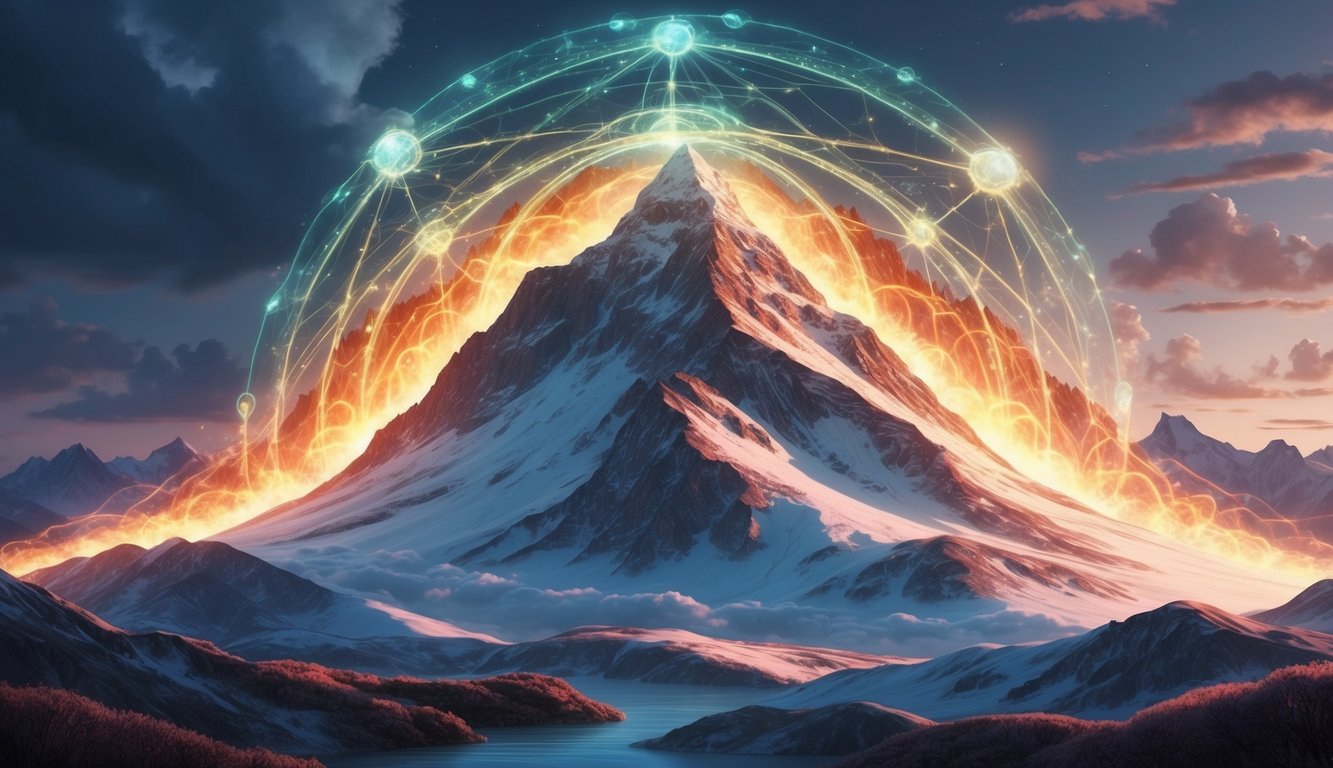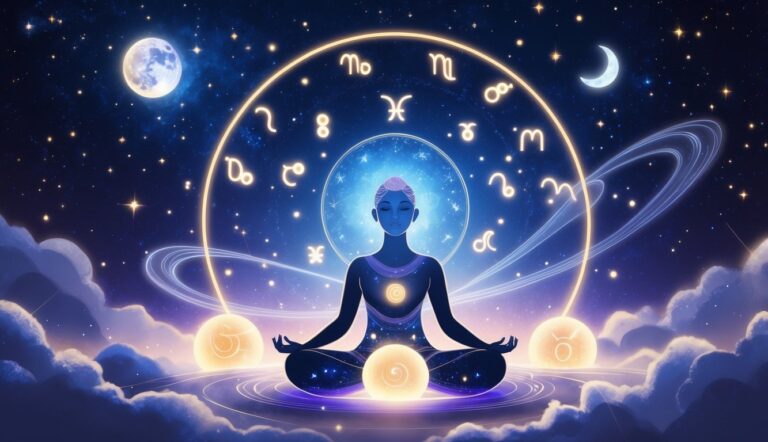Align Your Life with Your True North
The Power Quadrant System decodes your natural talents and pinpoints the career, timing and relationships that let you earn more, love deeper, and wake up eager for the day.
- Uncover your #1 high-income strength
- Draw in partners who raise your energy
- Work when your body’s clock is in “flow”
Have you ever felt a profound sense of connection to something greater than yourself? That’s a glimpse into higher consciousness.
It’s a state of expanded awareness where you transcend your everyday thoughts and tap into deeper truths about reality.
Higher consciousness allows you to see beyond your limited self-concept and experience a more unified perspective on life. You might feel more attuned to nature, have moments of clarity about your life purpose, or sense an underlying oneness with all beings.
This shift in perception can be transformative, leading to greater compassion, creativity, and inner peace.
Developing higher consciousness isn’t about escaping reality – it’s about engaging with it more fully.
As you cultivate this awareness through practices like meditation, mindfulness, or contemplation, you may find yourself approaching challenges with more wisdom and living with greater authenticity.
Ready to explore the potential of your own consciousness? Let’s dive deeper into what higher consciousness means and how you can access it in your daily life.
Defining Higher Consciousness
Higher consciousness refers to a state of expanded awareness and perception.
It’s a level of consciousness that goes beyond your everyday thinking and experiences.
In this state, you gain a deeper understanding of yourself, reality, and the interconnectedness of all things.
You may feel a sense of unity with the world around you.
Decode Your Personal Success Blueprint
Power Quadrant System shows you the exact career, relationships, and daily rhythm that match your natural DNA—so you earn more, work happier, and connect deeper.
- Pinpoint your #1 money-making talent
- Erase conflict & attract ideal partners
- Multiply productivity with perfect timing
Higher consciousness often involves transcending your ego and limited self-concept.
You become more aware of your thoughts, emotions, and inner experiences.
Some key aspects of higher consciousness include:
- Increased self-awareness
- Greater empathy and compassion
- Enhanced intuition
- Feelings of peace and contentment
- Sense of purpose and meaning
Reaching higher consciousness isn’t about achieving a permanent state.
It’s more like moments of clarity and expanded perception that you can cultivate over time.
Many practices can help you access higher states of consciousness:
- Meditation
- Mindfulness
- Yoga
- Contemplative prayer
- Psychedelic experiences (in controlled settings)
As you explore higher consciousness, you may find yourself questioning long-held beliefs and seeing the world in new ways.
It’s a journey of personal growth and self-discovery.
Historical Perspectives
Tap Into Your Built-In Success GPS
The Power Quadrant System deciphers your genetic blueprint so you can lock onto the career, income and relationships that feel effortless—and wildly rewarding.
- Zero in on your natural high-earning genius
- Sync with partners who boost your vibe
- Wake up driven, finish days fulfilled
The quest for higher consciousness has deep roots across cultures and philosophical traditions.
Different approaches emerged in Eastern and Western thought, shaping views on expanding awareness and spiritual enlightenment.
Eastern Traditions
You’ll find rich perspectives on higher consciousness in Eastern philosophies.
In Hinduism, the concept of “atman” refers to the eternal, conscious self beyond the ego.
Yoga and meditation aim to reveal this higher self.
Buddhism teaches mindfulness and non-attachment to transcend suffering and achieve enlightenment.
The eightfold path provides guidance for expanding awareness.
Taoism emphasizes aligning with the Tao, or universal flow, to attain higher states of being.
Practices like qigong cultivate life energy.
Western Philosophies
Western thinkers have also explored expanded consciousness.
Ancient Greek philosophers like Plato pondered the nature of reality and the soul.
Later, during the Enlightenment, philosophers and scientists such as Descartes and Spinoza examined the relationship between mind and matter.
In modern times, researchers in psychology and neuroscience investigate altered states of consciousness, further exploring the science and spirituality connection.
This ongoing inquiry bridges the gap between empirical study and mystical experience.
You’ll see mystical traditions in Christianity, Judaism, and Islam seeking union with the divine through contemplation.
The Transcendentalists emphasized intuition and direct spiritual experience.
Figures like Emerson wrote about the “Over-Soul” uniting all beings.
Modern psychology brought new perspectives.
Jung’s collective unconscious and Maslow’s peak experiences examined higher states of mind.
Paths to Enlightenment
Seeking higher consciousness involves exploring various spiritual practices and experiences.
These paths can lead to profound insights, expanded awareness, and a deeper connection with your true self.
Meditation Practices
Meditation is a powerful tool for cultivating higher consciousness.
You can start by finding a quiet space and sitting comfortably.
Then, focus on your breath and allow thoughts to pass without judgment.
Regular practice can help you develop greater self-awareness and inner peace.
Try different techniques like mindfulness, loving-kindness, or transcendental meditation to find what resonates with you.
Consistency is key.
Even short daily sessions can yield significant benefits over time.
As you progress, you may experience moments of clarity, reduced stress, and a heightened sense of presence.
Psychedelic Experience
Psychedelic substances like psilocybin mushrooms or ayahuasca have been used for centuries in spiritual practices.
These experiences can offer profound insights and shifts in perspective.
Always prioritize safety and legality.
Seek guidance from experienced practitioners or trained professionals.
Set and setting are crucial for a positive experience.
Psychedelics may dissolve ego boundaries and foster a sense of unity with the universe.
Integration is essential – take time to reflect on and apply the insights gained from your journey.
Yoga and Mindfulness
Yoga combines physical postures, breath work, and meditation to promote holistic well-being.
Regular practice can increase body awareness, reduce stress, and cultivate inner peace.
Start with beginner-friendly classes or online tutorials.
Focus on proper alignment and breathing techniques.
As you progress, you’ll develop strength, flexibility, and mental clarity.
Mindfulness involves bringing your attention to the present moment.
Practice it throughout your day – while eating, walking, or performing routine tasks.
This cultivates a state of continuous awareness, helping you stay grounded and connected to your higher self.
Scientific Exploration
Researchers are making strides in understanding higher consciousness through empirical methods.
Neuroscience and psychology offer valuable insights into altered states and self-transcendence.
Neuroscience Insights
Brain imaging techniques have revealed intriguing patterns during meditation and psychedelic experiences.
fMRI scans show decreased activity in the default mode network, associated with self-referential thinking.
This may explain the sense of ego dissolution often reported.
Studies indicate increased connectivity between typically separate brain regions during altered states.
This heightened neural integration could underlie feelings of unity and expanded awareness.
Neurotransmitters like serotonin play a key role.
Psychedelics that mimic serotonin can induce profound shifts in consciousness.
This suggests serotonin pathways may be involved in everyday states of awareness too.
Psychology of Self-Transcendence
Self-transcendence involves moving beyond your ordinary sense of self.
It’s often described as feeling connected to something greater.
Research shows this can boost well-being and reduce anxiety.
Mindfulness practices cultivate present-moment awareness.
Over time, this can shift your perception of self.
You may feel less identified with your thoughts and more attuned to direct experience.
Peak experiences, studied by Abraham Maslow, share features with higher states of consciousness.
These include a sense of awe, unity, and transcendence of ordinary reality.
They often leave a lasting positive impact on one’s outlook and values.
Flow states, where you’re fully absorbed in an activity, may offer a glimpse of expanded consciousness.
In flow, your sense of self seems to disappear as you merge with the task at hand.
Characteristics of Higher Consciousness
Higher consciousness manifests through distinct qualities that transform your perception and interaction with the world.
You’ll notice shifts in your awareness, intuition, and emotional connections as you access deeper levels of consciousness.
Expanded Awareness
You begin to see the bigger picture of life when experiencing expanded awareness.
Your perspective broadens beyond personal concerns, encompassing a wider view of reality.
You start noticing interconnections between events and people that previously seemed unrelated.
Colors appear more vivid, and you feel more present in each moment.
Time perception may change, with moments seeming to stretch or compress.
You become acutely aware of your thoughts and emotions, observing them without judgment.
This heightened state allows you to tap into universal knowledge and wisdom.
You may experience sudden insights or “aha” moments that provide clarity on complex issues.
Deep Intuition
Your intuition sharpens dramatically in higher states of consciousness.
You start trusting your gut feelings more, as they often prove accurate.
Making decisions becomes easier as you tune into your inner guidance.
You might experience premonitions or déjà vu more frequently.
These glimpses into potential futures or past connections feel natural and informative.
Your ability to read others improves.
You pick up on subtle cues in body language and energy that most people miss.
This enhanced perception helps you navigate social situations with greater ease and understanding.
Compassion and Empathy
As your consciousness expands, so does your capacity for compassion and empathy.
You feel a deep connection to all living beings, recognizing the shared essence of existence.
Judgments fade away, replaced by acceptance and understanding.
You find it easier to forgive others and yourself, releasing old grudges and resentments.
Your actions become more altruistic.
You’re drawn to help others without expecting anything in return.
This selfless love extends beyond humans to animals, plants, and the Earth itself.
You experience a profound sense of unity with the universe.
This oneness dissolves feelings of separation and isolation, replacing them with peace and harmony.
Challenges and Misconceptions
Seeking higher consciousness can be challenging and is often misunderstood.
You may face internal and external obstacles on your journey, as well as encounter cultural misinterpretations of what it means to reach elevated states of awareness.
Common Obstacles
Self-doubt can hinder your progress.
You might question if you’re making any real advancement or if higher consciousness is even attainable.
Impatience is another hurdle – expecting instant results can lead to frustration.
Distractions of daily life can pull your focus away.
Work stress, relationship issues, and technology overload may derail your efforts.
Maintaining consistent practice amidst a busy schedule takes dedication.
Fear of the unknown can also hold you back.
Exploring unfamiliar mental states might feel uncomfortable or even frightening at first.
Letting go of old thought patterns and beliefs can be challenging but necessary for growth.
Cultural Misunderstandings
Some view higher consciousness as an escape from reality, but it’s actually about engaging more fully with life.
It’s not about detaching from the world, but seeing it with greater clarity and compassion.
There’s a misconception that you need to be religious or follow a specific spiritual path.
In reality, higher consciousness is accessible to anyone willing to look within, regardless of beliefs.
Pop culture often portrays higher states as constant bliss or superhuman abilities.
This creates unrealistic expectations.
True growth involves facing both light and shadow aspects of yourself.
Some dismiss the pursuit as selfish or impractical.
Yet, developing greater awareness can lead to more meaningful contributions to society and improved relationships with others.
Practical Applications
Integrating higher consciousness into your life can lead to profound personal growth and positive changes.
You can apply these principles across various areas to enhance your experiences and interactions.
In Daily Life
Start your day with a brief meditation to set a mindful tone.
Take a few deep breaths and focus on your intentions for the day ahead.
Practice active listening in your conversations.
Give others your full attention without judgment.
Cultivate gratitude by noting three things you’re thankful for each evening.
This simple habit can shift your perspective and increase overall life satisfaction.
When faced with challenges, pause and view them as opportunities for growth rather than obstacles.
Incorporate mindful eating into your routine.
Savor each bite, noticing textures and flavors.
This practice can improve your relationship with food and increase enjoyment of meals.
In Professional Settings
Bring higher consciousness to your workplace by practicing presence during meetings.
Put away distractions and engage fully with colleagues.
This can lead to more productive discussions and creative problem-solving.
Before making important decisions, take a moment for reflection.
Consider the wider impact of your choices on others and the environment.
This approach can result in more ethical and sustainable business practices.
Use mindfulness techniques to manage stress.
Try a quick breathing exercise between tasks to reset and refocus.
This can boost productivity and improve your overall work experience.
In Educational Environments
Incorporate mindfulness into your study routine.
Begin study sessions with a brief centering exercise to improve focus and retention.
Take short mindful breaks to prevent burnout and maintain concentration.
Practice non-judgmental awareness when learning new concepts.
Approach challenging subjects with curiosity rather than frustration.
This mindset can enhance your learning experience and reduce stress.
Engage in reflective journaling after classes or study sessions.
Write about key insights and connections you’ve made.
This practice can deepen your understanding and help integrate new knowledge.
Contemporary Voices and Influencers
You might recognize Alain de Botton as a prominent figure in modern discussions of higher consciousness.
As the founder of The School of Life, he has brought philosophy back into the spotlight as a practical tool for personal growth.
De Botton emphasizes how higher consciousness represents a significant advancement over our primitive mindset.
It opens up new possibilities for human understanding and development.
Other influential thinkers are exploring different aspects of consciousness.
Some focus on the idea of a narrating ego, while others examine the core primate self or public persona.
The concept of pure awareness through witness consciousness has also gained traction.
This approach encourages you to observe your thoughts and experiences without judgment.
Scientific theories continue to evolve.
Higher-Order Theories of Consciousness and Global Neuronal Workspace are among the notable contemporary ideas being debated and researched.
You’ll find that sports influencers have recently become more prominent in discussions about consciousness and personal development.
Their perspectives often blend physical and mental aspects of self-improvement.
As you explore these contemporary voices, remember that consciousness is a complex topic.
Each influencer offers unique insights that can help you on your journey towards higher awareness.
Critiques and Counterarguments
Higher consciousness theories face several notable critiques.
Some argue these ideas overintellectualize consciousness, making it seem more complex than necessary.
Critics point out that higher-order theories rely heavily on the prefrontal cortex.
They claim that this focus may overlook other important brain regions involved in conscious experiences.
You might wonder if these theories can fully explain the rich, subjective nature of consciousness.
Some philosophers and scientists question whether a purely cognitive approach captures the qualitative aspects of our experiences.
Another challenge is the difficulty in empirically testing higher consciousness theories.
How can you measure or observe these proposed higher-order processes?
Some argue that simpler explanations, like early sensory models, might be sufficient to account for conscious experiences without invoking higher-order processing.
There’s also debate about whether higher-order theories can adequately explain altered states of consciousness, such as during meditation or psychedelic experiences.
Critics sometimes claim that these theories struggle to account for non-human animal consciousness, which may not involve the same higher-order cognitive processes.
Proponents of competing theories, like global workspace theory, argue their models better explain the broad range of conscious phenomena we experience.










